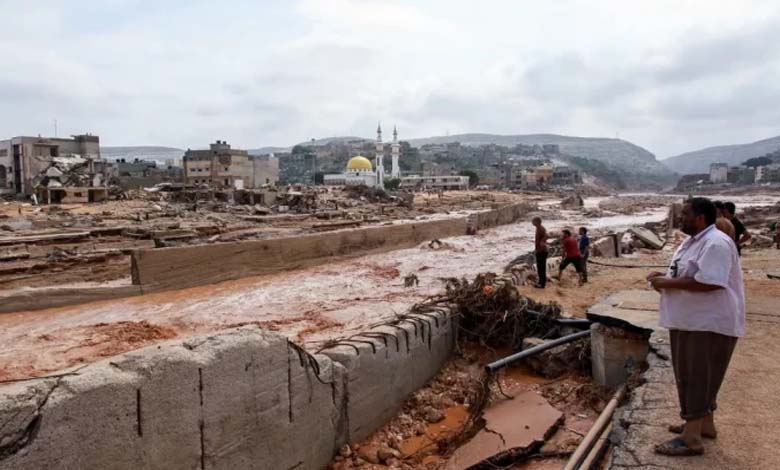Mutual Accusations… Libya’s Floods Expose Political Elites and Reveal the Ugly Face of Divisions
Libya's floods have ignited a firestorm of mutual accusations against the political elites and exposed the ugly reality of divisions

As the storm “Daniel” made its collision course with Libya in the Mediterranean Sea, officials in the eastern part of the country began issuing conflicting warnings. Orders were given to some residents in the coastal city of Derna to stay in their homes, while others were asked to evacuate.
When the storm struck, bringing heavy rains and fierce winds, there was no time to prepare. The old dams suddenly collapsed, allowing the river to inundate the hills overlooking the city. Floodwaters swept through Derna, washing away buildings, roads, cars, and residents into the open sea, killing more than 12,000 people so far.
Mutual Accusations
According to the British newspaper “Financial Times,” after nearly a week, a sense of mutual accusations began to be felt throughout the divided state, which has suffered from chaos and conflict for over a decade, leaving its infrastructure in decay and its institutions weak and hollow. While experts had long warned that Derna‘s dams were at risk of bursting, authorities rushed to absolve themselves.
Aguila Saleh, who presides over the eastern parliament, told Libyans: “No one can be blamed; God does as He wills, and we should not say if we had done this or that. What happened in our country was a natural disaster.”
Ahmed Mismari, the spokesman for the Libyan army, said the catastrophe was completely unexpected, despite meteorological warnings of possible floods before the storm reached land, a phenomenon that occurs in all countries.
The newspaper pointed out that what happened in Libya is unlike what occurs in other countries. It is a nation torn apart by wars and political divisions, despite possessing oil and natural resources comparable to those of Gulf countries, which makes its citizens struggle to obtain basic services and goods. The bickering political elites have divided the country, and today, they exchange accusations about the true cause of the disaster.
Major Failure
The British newspaper “Telegraph” confirmed that even the failure to maintain Derna’s dams has angered Libyans. Prominent journalist Khalil Al-Hasi, who, like many other Libyans, believes that the officials are guilty, said: “Everyone should resign.”
He continued: “We retrieve bodies from the sea with fishing nets as if they were fish. Fourteen years have passed with these people who caused this catastrophe. We do not trust their investigations or their justice. He said in a television interview: ‘We do not trust anything in this failed Libyan state.'”
The newspaper added that the period leading up to the catastrophe highlighted the systemic dysfunction afflicting the country.
An academic study published by a Libyan university journal last year warned of cracks in the dams and “dire consequences” if they failed. As the storm Daniel approached, authorities in Derna, led by the city’s mayor, a relative of Aguila Saleh, asked some people to leave and imposed a curfew on others.
Even with warnings preceding the storm, the dams were constructed in the 1970s with the assistance of a Yugoslavian company when Muammar Gaddafi ruled Libya. Just two years before his downfall in 2011, his government contracted with a Turkish company to carry out repairs, but the work appears to have been canceled due to the chaos surrounding the civil war that led to his ousting with NATO support.
Since then, Libya has witnessed a series of conflicts, including a devastating battle to retake Derna from militants linked to Al-Qaeda, which ended in 2019.
A former Western diplomat who worked in the country spoke of widespread anger in Libya, adding: “I hope that will be enough to drive out all these thugs and that there will be a unified government that governs Libya away from extremist terrorists.












